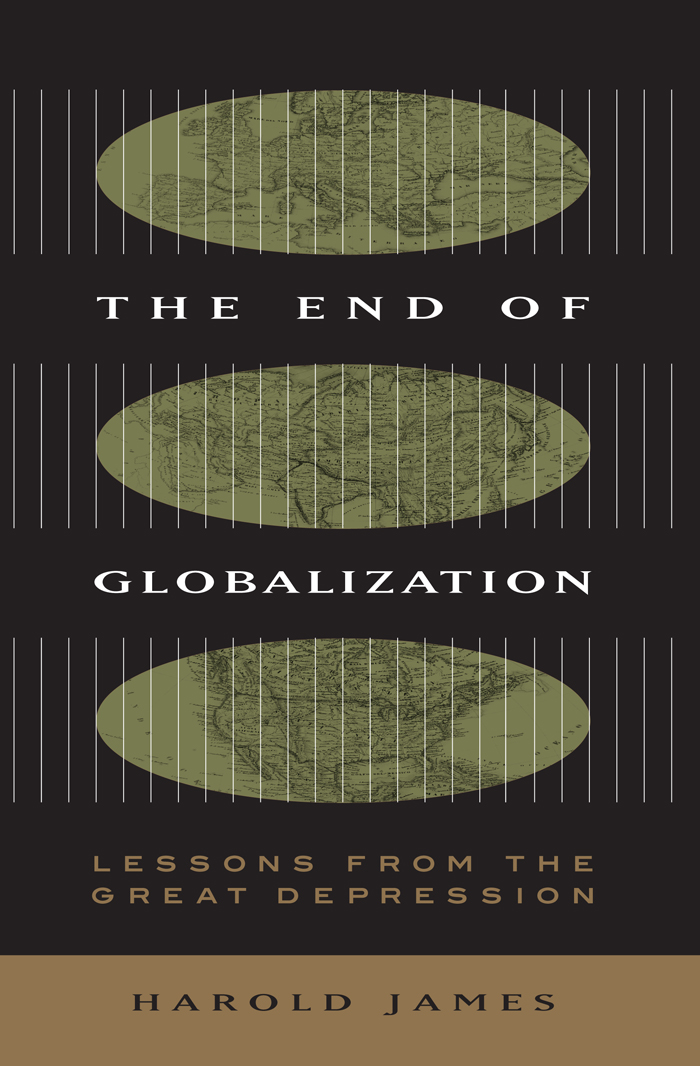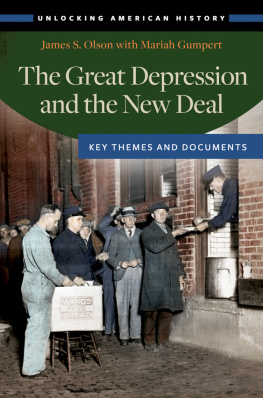Harold James - The End of Globalization: Lessons From the Great Depression
Here you can read online Harold James - The End of Globalization: Lessons From the Great Depression full text of the book (entire story) in english for free. Download pdf and epub, get meaning, cover and reviews about this ebook. year: 2001, publisher: HarvardUP, genre: Politics. Description of the work, (preface) as well as reviews are available. Best literature library LitArk.com created for fans of good reading and offers a wide selection of genres:
Romance novel
Science fiction
Adventure
Detective
Science
History
Home and family
Prose
Art
Politics
Computer
Non-fiction
Religion
Business
Children
Humor
Choose a favorite category and find really read worthwhile books. Enjoy immersion in the world of imagination, feel the emotions of the characters or learn something new for yourself, make an fascinating discovery.

- Book:The End of Globalization: Lessons From the Great Depression
- Author:
- Publisher:HarvardUP
- Genre:
- Year:2001
- Rating:4 / 5
- Favourites:Add to favourites
- Your mark:
- 80
- 1
- 2
- 3
- 4
- 5
The End of Globalization: Lessons From the Great Depression: summary, description and annotation
We offer to read an annotation, description, summary or preface (depends on what the author of the book "The End of Globalization: Lessons From the Great Depression" wrote himself). If you haven't found the necessary information about the book — write in the comments, we will try to find it.
The End of Globalization: Lessons From the Great Depression — read online for free the complete book (whole text) full work
Below is the text of the book, divided by pages. System saving the place of the last page read, allows you to conveniently read the book "The End of Globalization: Lessons From the Great Depression" online for free, without having to search again every time where you left off. Put a bookmark, and you can go to the page where you finished reading at any time.
Font size:
Interval:
Bookmark:

The End of Globalization
Lessons from the Great Depression
Harold James
HARVARD UNIVERSITY PRESS
Cambridge, Massachusetts
London, England
Copyright 2001 by the President and Fellows of Harvard College
All rights reserved
Printed in the United States of America
Fourth printing, 2002
First Harvard University Press paperback edition, 2002
Library of Congress Cataloging-in-Publication Data
James Harold.
The end of globalization : lessons from the Great Depression / Harold James.
p. cm.
Includes bibliographical references and index.
ISBN 0-674-00474-4 (cloth)
ISBN 0-674-01007-8 (pbk.)
1. International economic relations. 2. International trade.
3. International finance. 4. Depressions1929. 5. Financial crises.
6. National state. 7. GlobalizationEconomic aspects. I. Title.
HF1359 .J35 2001
337dc21 00-054157
This book has had a long gestation. I began thinking about the subject in the mid-1980s while writing a book on the interwar depression in Germany. Much of the archival research was done in the late 1980s. In the 1990s I interrupted the project in order to write a more optimistic book, about the success of post-1945 monetary cooperation, based in large part on the archives of the International Monetary Fund. This book is a return to a gloomier theme, in which past endeavors at globalization conjure up ghosts that still haunt the present, however prosperous and secure we may feel.
My research was made possible by several institutions. Princeton University, apart from providing a wonderful setting in which to write, generously funded much of the archival research. In the final stages of the work I was a Houblon-Norman Fellow at the Bank of England and then a Fellow at the Historisches Kolleg in Munich. Being at the Bank of England in the aftermath of the Asia crisis afforded a unique opportunity to discuss the policy implications of some apparently very distant history. I dealt with many archivists in many countries and would like to thank all of them, but especially Henry Gillette of the Bank of England, Rosemary Lazenby of the Federal Reserve Bank of New York, and Professor Dieter Lindenlaub of the Deutsche Bundesbank. The Historisches Kolleg provided an idyllic work environment for completing the book. I thank Eva Giloi-Bremner, Karsten Jedlitschka, and Clara Oberle for careful and thoughtful research assistance.
I presented earlier versions of my argument in the following pages at seminars at various universities (Mannheim, Frankfurt, Princeton, Vienna) and in lectures prepared for the Deutsche Bundesbank and the Bank of England, for Politeia in London, and for the Bavarian Academy of Sciences, as well as at seminars organized by Robert Fleming and by the Herbert Quandt Foundation. I should like to thank the participants in those discussions, and especially Bill Allen, Axel Brsch-Supan, Christoph Buchheim, Gerhard Illing, Markus Ingenlath, Stanley Katz, Mervyn King, Sheila Lawlor, Dieter Lindenlaub, David Marsh, Kai Schellhorn, and Alice Teichova, who organized the events. The Mellon Foundations Sawyer Program funded a year-long interdisciplinary seminar at Princeton in 199798 on Western Economic Values and the Alternatives, whose regular participants and visiting speakers helped me clarify many arguments about the lessons learned from history. In April 1998 Princeton University organized jointly with the German Historical Institute, Washington, D.C., a two-day conference on the international financial system in the twentieth century. In June 1999 the Historisches Kolleg organized a colloquium of experts in this field to present their research and to discuss the subject in general. Those who attended and presented papers were Christoph Buchheim, Forrest Capie, Patricia Clavin, Barry Eichengreen, Gerald Feldman, Carl-Ludwig Holtfrerich, Albrecht Ritschl, Monika Rosengarten, Dietmar Rothermund, Robert Skidelsky, and Solomos Solomou. The colloquium was very skillfully managed by Elisabeth Mller-Luckner. By an agreeable chance, the colloquium coincided with the seventieth birthday of the great German economic historian, Knut Borchardt, who has been a longtime friend and mentor and to whom this book is dedicated.
In addition, I should like to thank Michael Bordo and Douglas Irwin for reading a near-final version of the manuscript attentively and offering valuable suggestions. It was a pleasure working with Ann Hawthorne and Jeff Kehoe of Harvard University Press.
Marzenna James has been a constant friend and inspiration. Without her patience and love I could never have undertaken this project. Maximilian, Marie Louise, and Montagu (who was born just as this book was completed) have all been sources of inspiration.
Princeton, New Jersey
November 2000
Tables
Figures
At the turn of the millennium, globalization has become a catchword used worldwide. Increasing economic interconnectedness has led to a profound political and social revolution. Old certainties are cast into doubt. The nation-state, the decisive driving force of the past two centuries, is dissolving under the pressure of a cross-national integration, which has developed with a dynamic and a momentum of its own.
Often we believe that this process is irreversible, that it provides a one-way road to the future. But historical reflections lead to a more sober and more pessimistic assessment. There have already been highly developed and highly integrated international communities that dissolved under the pressure of unexpected events. But in every case the momentum was lost; the pendulum swung back. In Europe, for instance, the universal Erasmian world of the Renaissance was destroyed by the Reformation and its Catholic counterpart, and separatism, provincialism, and parochialism followed. A more immediate (and perhaps more familiar) precedent is the disintegration of the highly interconnected economic world of the late nineteenth century.
No collapse, of course, is precisely like any other. In the following pages I will not be attempting to argue that the Great Depression of the twentieth century will be restaged in the twenty-first. But each collapse results from patterns of thought and institutional mechanisms that arise in response to a new and unfamiliar international or cosmopolitan world. The form of such reactionary resentment remains astonishingly similar over long periods.
The failure of the World Trade Organization ministerial meeting in Seattle in November 1999 gives some indication of the problems facing the interconnected world today. The major industrial states failed to organize a realistic agenda. They overburdened the trade talks with inappropriate demands about environmental and especially labor standards, which many developing countries interpreted as a new protectionism under another guise. Finally, they appeared to encourage the apocalyptic street scenes in which citizens of mostly rich countries, who might have been expected to see themselves as beneficiaries of globalization, rioted against the new economic order. Instead of serious trade talks, Seattle turned into a chaotic symbolic protest against the internationally diffused culture of McDonalds: the beginning of a new phase in two long-standing conflicts, the North against the South, and the rest of the world against Americanism. Both are battles in a conflict over globalism. Did the battle of Seattle set the tune for the new century?
Font size:
Interval:
Bookmark:
Similar books «The End of Globalization: Lessons From the Great Depression»
Look at similar books to The End of Globalization: Lessons From the Great Depression. We have selected literature similar in name and meaning in the hope of providing readers with more options to find new, interesting, not yet read works.
Discussion, reviews of the book The End of Globalization: Lessons From the Great Depression and just readers' own opinions. Leave your comments, write what you think about the work, its meaning or the main characters. Specify what exactly you liked and what you didn't like, and why you think so.







